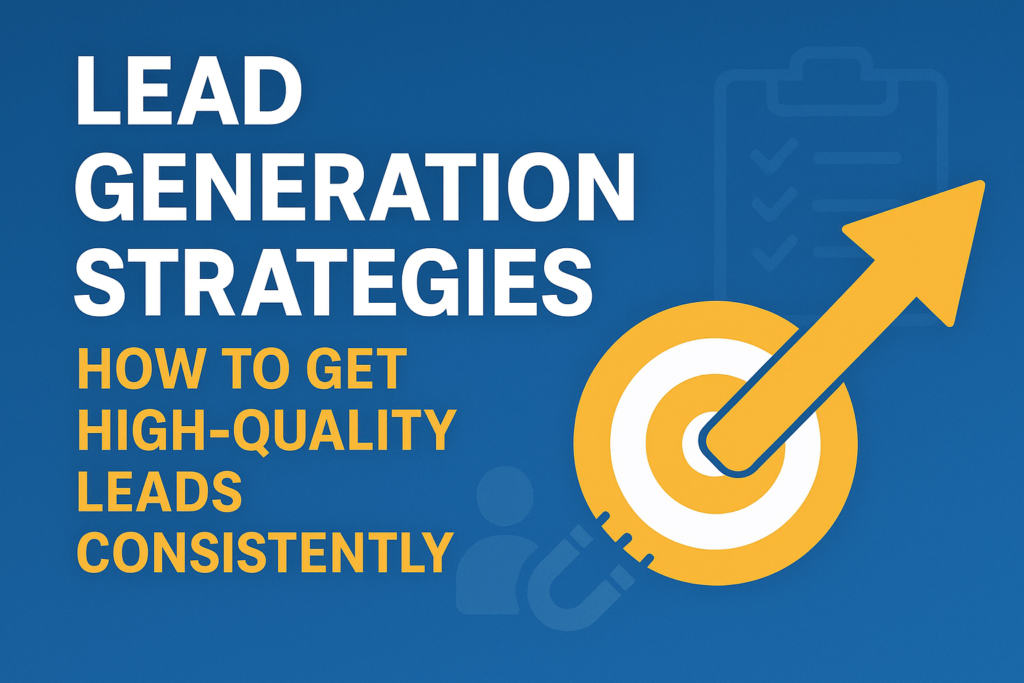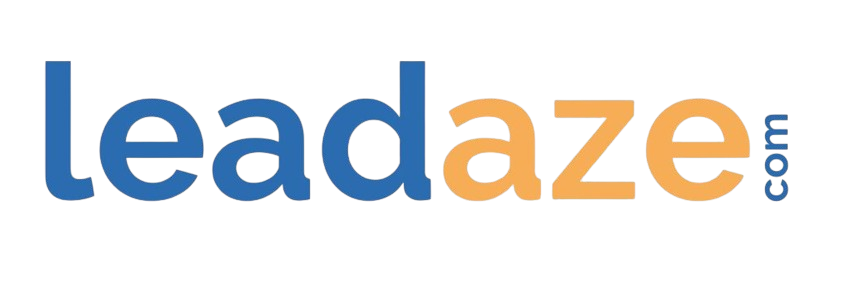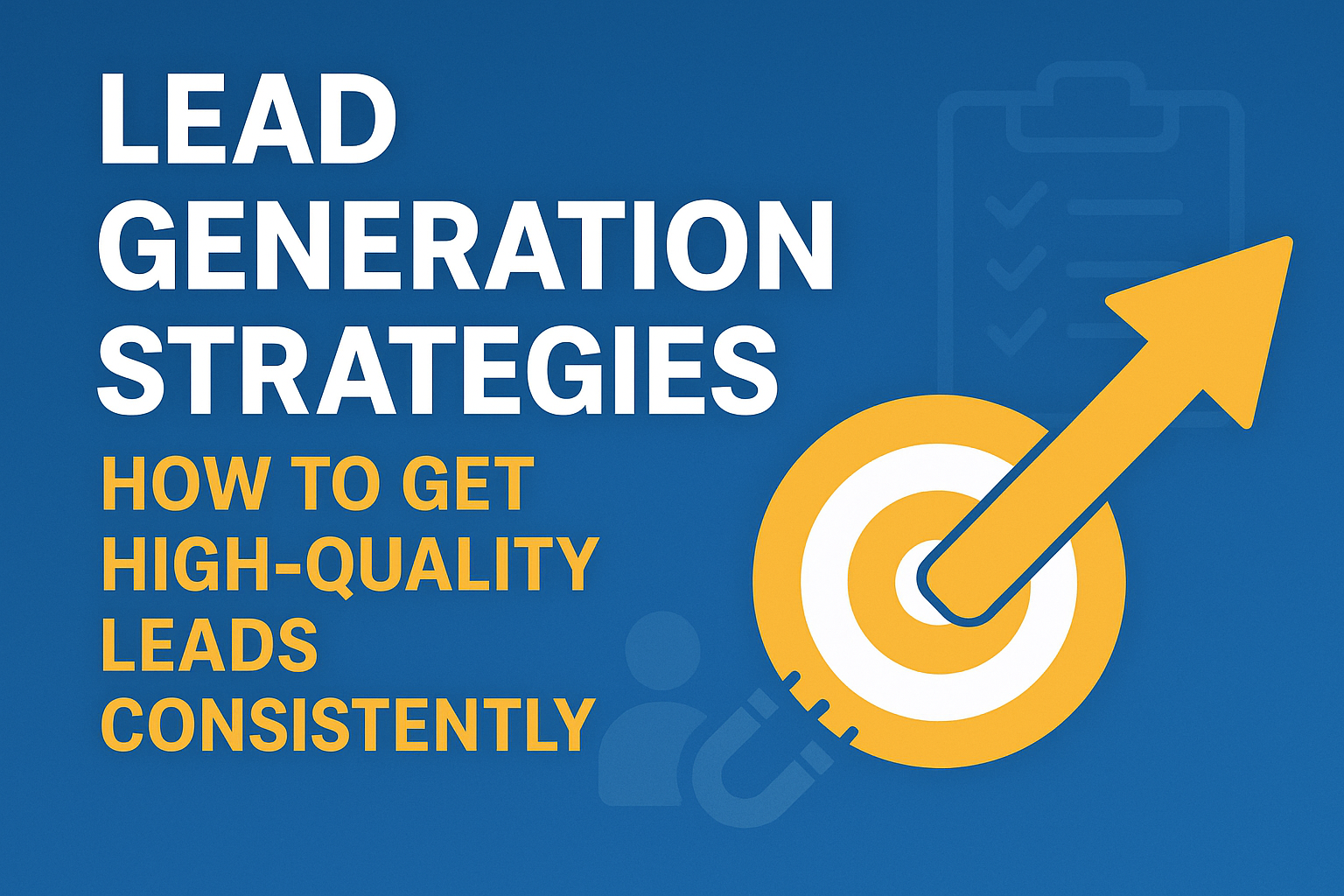Lead generation is the backbone of any thriving business. Without a steady influx of new prospects, sales pipelines dry up, and growth slows to a crawl. However, not all leads are created equal. The key to sustainable success lies in generating high-quality leads—people who are genuinely interested in your products or services and are more likely to convert into paying customers.
In this guide, we’ll explore a comprehensive range of lead generation strategies that not only fill your pipeline but also ensure the leads you attract are primed for conversion.

What is Lead Generation?
Lead generation is the process of attracting and converting strangers into potential customers who have expressed interest in your brand. This can be achieved through multiple marketing channels such as content marketing, SEO, social media, and paid advertising (All are parts of digital marketing’s)
A lead is typically captured when a person shares their contact information—such as an email address—in exchange for something valuable, like a free guide, consultation, or webinar.
Why High-Quality Leads Matter for Business Growth
Not all leads are worth pursuing. High-quality leads:
- Have a genuine need for your product or service.
- Possess the budget and authority to make a purchase.
- Show a higher likelihood of moving through the sales funnel.
Focusing on quality over quantity saves resources, shortens sales cycles, and improves your overall ROI.
Understanding High-Quality Leads
Defining a High-Quality Lead
A high-quality lead is a prospect who aligns closely with your ideal customer profile (ICP) and exhibits behaviors that signal buying intent—such as engaging with your content, visiting your pricing page, or requesting a demo.
Key Characteristics of Quality Leads
- Relevance – They fit your target demographic.
- Engagement – They interact with your brand consistently.
- Authority – They can influence or make purchasing decisions.
- Need – They have a problem your product solves.
Difference Between Quality and Quantity in Lead Generation
While more leads might seem better, a smaller number of targeted leads often results in higher conversion rates and more loyal customers.
Proven Lead Generation Strategies
Content Marketing for Lead Generation
Content is one of the most effective ways to attract and nurture leads.
- Blog Posts & SEO Optimization – Writing keyword-rich, valuable content helps you rank higher on search engines and attract organic traffic.
- Video Marketing and Webinars – Video content boosts engagement and trust, while webinars position you as an authority.
- Case Studies and Whitepapers – Offering in-depth industry insights can capture leads with higher purchase intent.
Social Media Lead Generation
Platforms like LinkedIn, Facebook, and Instagram are powerful tools for lead capture.
- LinkedIn Outreach – Personalized connection requests and valuable content sharing can yield high-quality B2B leads.
- Instagram & Facebook Ads – Targeted ads allow you to reach specific demographics effectively.
Email Marketing Campaigns
Email remains one of the most cost-effective lead generation tools.
- Personalization and Segmentation – Tailoring messages to different audience segments improves response rates.
- Automated Drip Campaigns – Nurture leads over time with strategically timed content.
Search Engine Optimization (SEO)
Optimizing your website ensures prospects can find you organically.
- On-Page SEO for Lead Magnets – Place clear CTAs on high-traffic pages.
- Local SEO for Targeted Leads – Focus on location-based searches for local businesses.
Pay-Per-Click (PPC) Advertising
Paid ads can drive instant traffic and leads.
- Google Ads Targeting Strategies – Use keyword targeting for high-intent searches.
- Retargeting and Remarketing Tactics – Re-engage visitors who didn’t convert the first time.
Advanced Lead Generation Tactics
AI and Chatbots for Lead Capture
Artificial intelligence is transforming the way businesses capture and qualify leads. Chatbots, embedded on websites or social media platforms, can:
- Engage visitors 24/7.
- Answer common questions instantly.
- Collect contact details for follow-ups.
- Qualify leads by asking targeted questions.
AI tools can also analyze lead behavior, predict purchase intent, and suggest personalized content offers.
Interactive Content (Quizzes, Calculators, Polls)
Interactive tools grab attention and encourage participation. Examples include:
- Quizzes: “Find Your Ideal Marketing Strategy” quiz.
- Calculators: ROI calculators for specific products.
- Polls & Surveys: Social media polls to understand audience needs.
Not only do these generate engagement, but they also provide valuable data for personalized marketing.
Influencer Collaborations
Influencers—both macro and micro—have established trust with their audiences. Partnering with relevant influencers allows you to:
- Access a highly engaged audience.
- Build credibility quickly.
- Leverage authentic product endorsements.
Referral and Affiliate Programs
Word-of-mouth remains one of the most powerful marketing forces. Implementing a referral program with incentives can:
- Encourage existing customers to promote your brand.
- Generate high-quality leads from trusted recommendations.
- Increase customer lifetime value through loyalty rewards.
Lead Nurturing Strategies
Building Trust Through Value
Lead nurturing is about guiding potential customers from interest to purchase. This requires providing:
- Educational content (guides, webinars, articles).
- Exclusive offers or early product access.
- Consistent communication without being pushy.
Multi-Channel Follow-Ups
Don’t rely on a single communication channel. Use a combination of:
- Email follow-ups.
- LinkedIn messages.
- Retargeting ads.
- SMS updates (with consent).
The goal is to stay top-of-mind without overwhelming the lead.
CRM Tools for Better Lead Management
Customer Relationship Management (CRM) systems such as HubSpot, Salesforce, or Zoho help:
- Track interactions across multiple touchpoints.
- Score leads based on engagement and demographics.
- Automate follow-up sequences.
- Provide sales teams with detailed customer insights.
Measuring Lead Generation Success
Key Metrics to Track
- Lead Conversion Rate – Percentage of leads turning into customers.
- Cost per Lead (CPL) – Total marketing spend divided by number of leads generated.
- Lead-to-Customer Ratio – Measures lead quality.
- Engagement Metrics – Click-through rates, time on page, and form submissions.
Lead Scoring Systems
Lead scoring assigns numerical values to each lead based on:
- Demographics.
- Behavioral data.
- Engagement levels.
- Purchase readiness.
This helps prioritize high-potential leads for faster conversion.
ROI Analysis of Lead Campaigns
Regularly reviewing the ROI of campaigns ensures that marketing budgets are spent on strategies that deliver results. This involves:
- Comparing CPL to average customer value.
- Identifying channels with the best returns.
- Adjusting targeting and messaging based on performance data.
Common Mistakes in Lead Generation and How to Avoid Them
Focusing on Quantity Over Quality
Attracting a large number of low-intent leads wastes resources. Always refine targeting to attract the right audience.
Ignoring Lead Follow-Up
Failing to follow up quickly can cause potential customers to lose interest. Implement automated systems to respond instantly.
Poor Target Audience Research
Without clear audience insights, marketing messages won’t resonate. Invest time in building detailed buyer personas.
Future Trends in Lead Generation
AI-Driven Personalization
Future marketing will be hyper-personalized, with AI delivering tailored offers and content to each lead in real time.
Voice Search Optimization
With the rise of smart speakers, optimizing for voice queries will become essential—especially for local businesses.
Data Privacy and Ethical Targeting
Consumers are increasingly concerned about data privacy. Brands that prioritize transparent data practices will gain trust and loyalty.
FAQs About Lead Generation Strategies
Q1: What’s the most cost-effective lead generation strategy?
Content marketing and SEO are often the most cost-effective because they generate organic leads over time without ongoing ad spend.
Q2: How long does it take to see results from lead generation campaigns?
Results can vary, but organic strategies like SEO may take 3–6 months, while paid campaigns can produce leads within days.
Q3: How do I know if a lead is high quality?
Look for engagement indicators, budget, decision-making authority, and alignment with your ideal customer profile.
Q4: Can social media really generate high-quality leads?
Yes—when combined with targeted ads, quality content, and consistent engagement, social media can be a strong lead source.
Q5: What’s the role of a CRM in lead generation?
A CRM organizes lead data, tracks interactions, scores leads, and automates follow-ups, making the process more efficient.
Q6: Is it better to outsource lead generation or do it in-house?
It depends on your resources and expertise. Outsourcing can provide instant expertise, while in-house teams have better brand alignment.
Conclusion
Consistently attracting high-quality leads isn’t about chasing every tactic—it’s about selecting the strategies that align with your audience, goals, and resources. From content marketing and SEO to AI chatbots and influencer partnerships, the possibilities are vast.
The businesses that succeed are those that:
- Focus on audience relevance over sheer volume.
- Leverage both organic and paid channels.
- Continuously analyze and refine their strategies.
When implemented effectively, the lead generation strategies in this guide will help you build a predictable, scalable flow of high-quality prospects—fueling long-term business growth.

